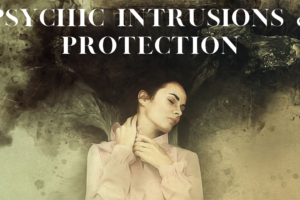It’s important to realize that there is a distinct difference between utilizing our Intuition and utilizing Psi. Both processes produce subtle awareness and so they can be easily confused. In fact, some people may innocently believe they are utilizing psi when in fact they are are simply utilizing their intuition. Let’s look at the differences.
Intuition
Intuition is a process that involves subtle perceptions & interactions arising from the physical material environment – even if those perceptions and interactions seem to be imperceptible or impossible. In other words, intuition is what we use when we see, hear, touch, feel, observe, and affect the the tangible, visible, material world.
For example, every day we are all reading people’s facial expressions, noting their tone of voice, and observing their body language. Even if we aren’t doing this consciously, we make decisions and take action based on these subtle observations. This involves the use of our intuition and would be called ‘Intuitive’ in nature, but these observations are not psychic.
Mentalism is another example of this intuitive process, but one that occurs at a conscious level. Mentalism is when a person trains themselves to pay attention to the subtle clues of others. In this way, what they share can ‘appear’ to be psychic in nature. So much so, we are often mystified that someone seems to mysteriously know our thoughts. To the mentalist, because the awareness and gaining of this information is now ‘conscious,’ they would not call it intuition but rather a trained ability or skill.
In the average person, intuition is not consciously cultivated. However, some people do seem to have a heightened intuitive sense and this may be due to one or more factors.
1. Heightened sensitivity may be the result of certain personality characteristics such as empathy and compassion: Perhaps this the reason women are often considered to be more ‘intuitive’ than men (although this is not an absolute).
2. Heightened sensitivity may be the result of close intimate relationships where we seem to know what the other person is thinking or feeling. This doesn’t neccesarily mean we are psychic – although it could. Oftentimes we simply become so in-synch with another person that we know what they’re going to do or are thinking. This evolves out of a close intimate connection and so may have nothing to do with anything psychic in nature.
3. Heightened sensitivity may be the result of trauma or situations that required an individual to become hyper-vigilant. For example, an individual that grew up in a verbally or physically abusive home may be keenly aware of the characteristics and moods of other abusers and victims. Because of their personal experience and the need for self-preservation, they became more perceptive of these aspects in others – even if it was not consciously done.
4. Heightened sensivity may be the result of a natural affinity for a given subject. For example, someone loves sewing, color, and patterns. As a result, they may feel they just intuitively know how to pick colors or to sew a pattern. They may also walk into a room and be more keenly aware of colors, fabrics, and patterns than those who have no affinity for these things. This affinity doesn’t make one psychic, but rather makes them more prone to the subtle awareness and interactions with these topics. It can be very intuitive and second nature but does not involve psi.
5. Heightened sensivity may be the result of training. For example, therapists, psychiatrists, police officers, lawyers, and doctors are prime examples of professions that need to be highly aware of the subtleties of other people and their surroundings. They are considered trained observers and therefore, like a mentalist, may see what others do not. But again, this does not make them psychic.
6. Heightened sensivity may be a result of persistent exposure. Anything we do or are exposed to on a regular basis can naturally create in us a more intuitive sensibility. For example, my husband and I used to breed and sell tropical fish. We had quite a substantial number of tanks and fish that required daily care. Because I was exposed to the fish daily I became keenly aware of when something was wrong, even before I consciously could say why. I just knew, but in no way did this make me psychic. It was simply my constant exposure that trained my subconscious mind to cluing me in to when things weren’t right. When I would honor that sensitivity and take a closer look, I was able to discover the issue at hand – my subconscious however was the tool for alerting me to the issue.
In Summary: Intuition is a process that we utilize every day as we observe and interact with the physical world around us, even if that observation & interaction is extremely subtle and less than obvious. Because of its subtlety, many people innocently believe they are psychic.
So let’s look at the psi process and why it differs from intuition.
Psi
Psi is a process that also involves subtle perceptions & interactions. It is theorized by Jim Carpenter in First Sight Theory that psi is always taking place in all people. It too arises from the subconscious mind moving into the conscious mind and being recognized as a psychic ‘Hit.’ The difference between psi and intuition is the source of the subsequent information. In intuitive awareness, information arises from the physical material environment while psi-based information arises from an interaction with the unseen immaterial world. This means that psychic information and interactions are in no way tied to any observable physical information or arise due to any physical preference or affects. In other words, the psi process still involves seeing, hearing, feeling, perceiving, and even affecting the world around us, but this is done without the use of any material or physical faculties.
Obviously this process looks and even feels much like intuition but with two major differences – where the information arises from, and another cricitical somponent of its existence outside of time and space.
Virtually all people, at one time or another, have had a psi-based experience. They may not have identified it as such, but the process whereby this happens was indeed at work.
For example, many people have had a dream where some portion of it to come true. Many people have thought of someone or got a sense of a person only for them to call, contact, or show up. Many of us have had an odd sense of dread or that something bad was about to happen only for it to take place. Many of us may have had a strong emotion or the feeling of a presence after the death of a loved one. Many people have wished or prayed for something only to have it miraculously appear in their lives. Many of us have sang a song or thought of a movie only for it to show up.
These examples exemplify what results from the psi process, even though most people who have these experiences would not consider themselves psychic in any way. Nevertheless, what happened was an event that could not be explained by any physical affects or physical observation. They simply occurred, but more importantly, were probably identified because of their strange affect on us. Just think of how many other psi related experiences we can and might have if we became conscious of them.
In the average person, like intuition, psi is not consciously cultivated. However, some people do seem to have a heightened psychic sense and this may be due to one or more factors.
1. Some individuals are simply more consciously aware of these psi perceptions and interactions. (See the post entitled “Is A ‘Naturally Born Psychic’ Better? A Few Key Aspects Psychic Functioning”) They happen spontaneously so are not always controlled or developed unless consciously cultivated, but these individuals are keenly aware of when they happen.
2. Some individuals seem to have certain characteristics that promote psi functioning. Christine Simmonds-Moore is an Assistant Professor of Psychology at the University of West Georgia. She has a PhD in psychology from the University of Northampton and has been doing studies on the relationship between psi and personality. She calls it the ‘anomaly prone personality.’ Some of these characteristics include boundary thinness, sensitivity, and connectedness. You can research her work, but she clearly reports that certain individuals possess characteristics which make them more prone to spontaneous psi.
3. Psi susceptibility does appear to be genetic. It does seem to run in families, although the cause of this is not yet fully known. Here is a recent study by Helane Wahbeh, et al, 2021 supporting this potential.
4. Psi susceptibility also occurs more often in those who believe in it. This is not due to some form of delusion but rather that belief allows for psi-related events to be brought into the conscious mind. Belief also allows someone to take note of when psi events might be taking place and then to give them value rather than dismissal. This also reinforces to the subconscious to give these perceptions more attention which can also lead to increased frequency. It is also intersting to note that disbelief actually repels psi. This has been successfully tested and accepted in academia and is referred to as the Sheep Goat Effect.
5. Those who easily experience or induce altered states. Suppression of the rational thinking mind allows for the more free-flowing creative mind to emerge. Altered states promote this flow of creativity but also allows psi-related experiences to move through at the same time. Hence the feeling of creativity and psi being connected or similar.
In Summary: Like intuition, psi functioning happens to all people spontaneously and on a daily basis. It is merely another informational and interactive process, but one that functions at the immaterial (and perhaps quantum) level. Psi is naturally more noticeable in some individuals and more suppressed in others, but both types of people can cultivate their psi.
So why do some people use the term intuitive as opposed to the term psychic?
The first reason is that the term psychic is scoffed-at and ridiculed. Some people hear the word psychic and think of fortune-tellers and frauds, or perhaps someone who is a little crazy, self-delusional, or even mentally ill. Because of these negative connotations, some psychic people prefer the less derogatory term of intuitive – especially those with more academic or professional backgrounds. Saying one is intuitive is far more readily embraced than saying one is psychic, even if the process being utilized is in fact psychic and not intuitive.
The second reason the word intuitive may be used for a psychic process is because sometimes people just don’t really understand the difference between the two. This occurs when highly intuitive people believe they are psychic – but aren’t, or, when psychic people aren’t fully aware of when they are being psychic versus when they are being intuitive. Sometimes people just believe these two process are the same.
The third reason is that psi processes involve a wide range of functions that involve far more than just being ‘psychic.’ Unless someone has read and studied Parapsychology, they may tend to think of psi or psychic as being a narrow box of functions of ‘just knowing stuff.’ However, psi has a wide range of potentials – all depending on how it works for the individual. For example, some people are excellent at influencing healing in others. This involves the use of Expressive Psi or mind-over-matter, but those who use this form of psi do not consider themselves psychic. Another example are those individuals who can induce an out of body experience (OBE’s). An OBE also involves a psi-process but is not something we would typically call ‘psychic.’
In the end, calling one’s self intuitive is a little more acceptable to the mainstream, even though it is not really an accurate term for the true process of being psychic. It’s really a personal choice. However, it is important that anyone who does psychic work is aware of the differences in these processes, and can, if asked, explain them to their sitters. If you don’t know which process you are using, then I highly suggest you test yourself until you know the difference.
I will close by saying that BOTH psychic and intuitive information have value and relevance. One is not better than the other. Sadly, too many people believe that psychic information is somehow superior – as if it comes from some magical all-knowing realm. This may be true if the source of our psychic information is coming from an advanced Discarnate being, but then again it might not be. Knowing the source of one’s psychic information is another critical part of the developmental process and should be carefully expressed to the Sitter. However, intuitive information is also a wealth of insight. What matters is how helpful the information is to the sitter, combined with an ethical approach for the source of one’s insights.
Cheers & Wellness,
Carol
Photo by Ryoji Iwata on Unsplash




